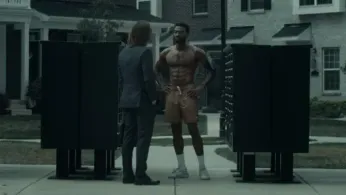
3 hours ago
Jelani Alladin Stars in "Next Year": A Dystopian Film Where Love Defies Oppression
READ TIME: 3 MIN.
In the short film "Next Year," acclaimed actor Jelani Alladin takes on the role of Robert, a grieving father and husband, in a dystopian America where the government has outlawed homosexuality and imposed "traditional values"as law. Written and directed by queer filmmakers Peter DiMario and Guto Barra, the film explores themes of resilience, fear, and forbidden love, resonating deeply with ongoing global conversations about LGBTQ+ rights and the rise of authoritarian ideologies .
"Next Year" opens on Robert as he mourns the loss of his husband in a society that has turned violently hostile toward LGBTQ+ people. The government, now enforcing draconian anti-LGBTQ+ laws, has banned queer people from accessing banks, orchestrates raids on gay bars, and surveils citizens for any "suspicious homosexual activity. "In this climate of fear, public broadcasts demand the reporting of anyone suspected of same-sex relationships, and community trust is eroded .
Robert's world is further complicated when he grows close to his neighbor, played by Zach Martens. Their connection offers hope and intimacy but is fraught with danger; every public gesture, every private moment, could lead to arrest or worse. The film’s trailer encapsulates this tension as Robert says, "We all know when that asshole won that things would be bad. We had no idea they were going to be this bad, "responding to the new reality ushered in by a reactionary political shift .
Jelani Alladin, celebrated for his role as Marcus Hooks in "Fellow Travelers," brings emotional depth and vulnerability to Robert. Alladin is joined by Zach Martens as the neighbor and new love interest, and Sherz Aletaha rounds out the cast. The film is helmed by Peter DiMario and Guto Barra, a queer filmmaking duo known for their incisive, socially conscious storytelling .
While "Next Year" is set in a speculative future, its depiction of state-sanctioned anti-LGBTQ+ oppression draws clear parallels to ongoing struggles faced by queer communities worldwide. In the United States and beyond, legislative efforts to curtail LGBTQ+ rights, from restricting access to gender-affirming care to bans on LGBTQ+ content in schools, have heightened anxieties about the erosion of hard-won liberties .
The film’s creators underscore this connection, describing "Next Year" as "a deeply personal and politically resonant film that reflects the challenges facing LGBTQ+ communities today. .. both a warning and a testament to the resilience of love in dark times" .
"Next Year" stands out for its authentic portrayal of queer love and loss, crafted by LGBTQ+ writers and directors and featuring out actors in central roles. This commitment to representation is vital, especially in a media landscape where LGBTQ+ stories are often marginalized or sanitized. The film does not shy away from the harsh realities faced by its characters, yet it insists on the enduring power of connection and the human spirit.
The film’s screening at international film festivals signals both its artistic merit and its resonance with global audiences. As anti-LGBTQ+ sentiment and policy surge in various regions, works like "Next Year" provide a crucial counter-narrative, fostering empathy and solidarity .
"Next Year" joins a tradition of speculative fiction that uses dystopian futures to critique present-day injustices and rally resistance. By grounding its story in the lived experiences of queer people and drawing on the anxieties of the contemporary moment, the film prompts viewers to reflect on the fragility of rights and the necessity of vigilance.
For LGBTQ+ viewers, the film’s message is both sobering and empowering: oppression is not inevitable, and love, in all its forms, remains a radical act of hope.
As of November 2025, "Next Year" is screening at select international film festivals, with its trailer receiving significant attention online. A general release date has not yet been announced, but the film's impact is already being felt in conversations about art, activism, and the future of LGBTQ+ rights .
"Next Year" is more than a cautionary tale; it is a call to awareness and action. Through Jelani Alladin’s moving performance and the film’s uncompromising vision, it urges viewers to imagine what is at stake—and what can be preserved—when love is forced underground. As debates about LGBTQ+ equality continue to shape policy and culture, stories like "Next Year"ensure that the human cost of bigotry is never forgotten.






